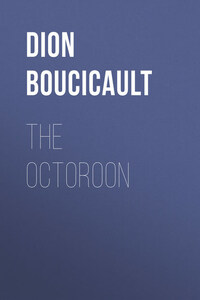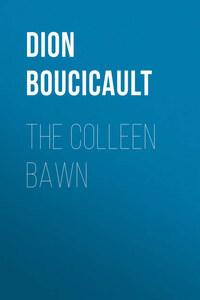Scene I. —A view of the Plantation Terrebonne, in Louisiana. – A branch of the Mississippi is seen winding through the Estate. – A low built, but extensive Planter's Dwelling, surrounded with a veranda, and raised a few feet from the ground, occupies the L. side. – A table and chairs, R. C.
Grace discovered sitting at breakfast-table with Children
Enter Solon, from house, L
Solon. Yah! you bomn'ble fry – git out – a gen'leman can't pass for you.
Grace. [Seizing a fly whisk.] Hee! ha – git out! [Drives Children away; in escaping they tumble against and trip up Solon, who falls with tray; the Children steal the bananas and rolls that fall about.]
Enter Pete, R. U. E. [he is lame]; he carries a mop and pail
Pete. Hey! laws a massey! why, clar out! drop dat banana! I'll murder this yer crowd, [He chases Children about; they leap over railing at back. Exit Solon, R. U. E.] Dem little niggers is a judgment upon dis generation.
Enter George, from house, L
George. What's the matter, Pete.
Pete. It's dem black trash, Mas'r George; dis ere property wants claring; dem's getting too numerous round; when I gets time I'll kill some on 'em, sure!
George. They don't seem to be scared by the threat.
Pete. Top, you varmin! top till I get enough of you in one place!
George. Were they all born on this estate?
Pete. Guess they nebber was born – dem tings! what, dem? – get away! Born here – dem darkies? What, on Terrebonne! Don't b'lieve it, Mas'r George; dem black tings never was born at all; dey swarmed one mornin' on a sassafras tree in the swamp: I cotched 'em; dey ain't no 'count. Don't b'lieve dey'll turn out niggers when dey're growed; dey'll come out sunthin else.
Grace. Yes, Mas'r George, dey was born here; and old Pete is fonder on 'em dan he is of his fiddle on a Sunday.
Pete. What? dem tings – dem? – getaway [makes blow at the Children.] Born here! dem darkies! What, on Terrebonne? Don't b'lieve it, Mas'r George, – no. One morning dey swarmed on a sassafras tree in de swamp, and I cotched 'em all in a sieve. – dat's how dey come on top of dis yearth – git out, you, – ya, ya! [Laughs.]
Enter Mrs. Peyton, from house
Mrs. P. So, Pete, you are spoiling those children as usual!
Pete. Dat's right, missus! gib it to ole Pete! he's allers in for it. Git away dere! Ya! if dey aint all lighted, like coons, on dat snake fence, just out of shot. Look dar! Ya! ya! Dem debils. Ya!
Mrs. P. Pete, do you hear?
Pete. Git down dar! – I'm arter you!
Mrs. P. You are out early this morning, George.
George. I was up before daylight. We got the horses saddled, and galloped down the shell road over the Piney Patch; then coasting the Bayou Lake, we crossed the long swamps, by Paul's Path, and so came home again.
Mrs. P. [Laughing.] You seem already familiar with the names of every spot on the estate.
Enter Pete.– Arranges breakfast, &c
George. Just one month ago I quitted Paris. I left that siren city as I would have left a beloved woman.
Mrs. P. No wonder! I dare say you left at least a dozen beloved women there, at the same time.
George. I feel that I departed amid universal and sincere regret. I left my loves and my creditors equally inconsolable.
Mrs. P. George, you are incorrigible. Ah! you remind me so much of your uncle, the judge.
George. Bless his dear old handwriting, it's all I ever saw of him. For ten years his letters came every quarter-day, with a remittance and a word of advice in his formal cavalier style; and then a joke in the postscript, that upset the dignity of the foregoing. Aunt, when he died, two years ago, I read over those letters of his, and if I didn't cry like a baby —
Mrs. P. No, George; say you wept like a man. And so you really kept those foolish letters?
George. Yes; I kept the letters, and squandered the money.
Mrs. P. [Embracing him.] Ah! why were you not my son – you are so like my dear husband.
Enter Salem Scudder, R
Scud. Ain't he! Yes – when I saw him and Miss Zoe galloping through the green sugar crop, and doing ten dollars' worth of damage at every stride, says I, how like his old uncle he do make the dirt fly.
George. O, aunt! what a bright, gay creature she is!
Scud. What, Zoe! Guess that you didn't leave anything female in Europe that can lift an eyelash beside that gal. When she goes along, she just leaves a streak of love behind her. It's a good drink to see her come into the cotton fields – the niggers get fresh on the sight of her. If she ain't worth her weight in sunshine you may take one of my fingers off, and choose which you like.
Mrs. P. She need not keep us waiting breakfast, though. Pete, tell Miss Zoe that we are waiting.
Pete. Yes, missus. Why, Minnie, why don't you run when you hear, you lazy crittur? [Minnie runs off.] Dat's de laziest nigger on dis yere property. [Sits down.] Don't do nuffin.
Mrs. P. My dear George, you are left in your uncle's will heir to this estate.
George. Subject to your life interest and an annuity to Zoe, is it not so?
Mrs. P. I fear that the property is so involved that the strictest economy will scarcely recover it. My dear husband never kept any accounts, and we scarcely know in what condition the estate really is.









